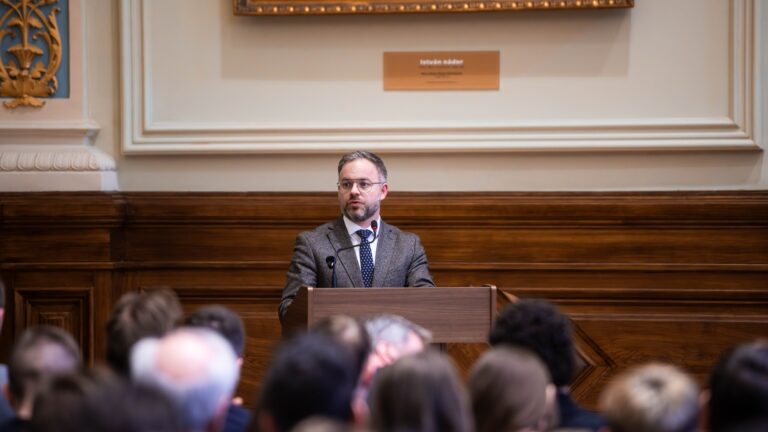For over two hundred years, Britain stood as a bulwark for freedom of speech and the rule of law. Yet the 31-month prison sentence handed to Lucy Connolly, a Northamptonshire childminder with no criminal history, for an offensive tweet reveals a judiciary concerned not with justice, but with optics and ideology.
In an increasingly censorious climate, where hurt feelings trump civil liberties, Connolly’s case lays bare not only the fragility of free expression in Britain but also the deep rot of a judicial system that punishes the unpopular far more harshly than it does the truly dangerous.
In July 2024, Mrs Connolly posted on X (formerly Twitter) following the horrific stabbing of three young girls at a dance class in Southport. Her post was expressed in pungent terms: ‘Mass deportation now. Set fire to all the f***ing hotels full of the bastards for all I care.’ It was a foolish comment; Mrs Connolly admitted as much, deleting it within four hours and issuing an apology.
Nevertheless, for this single act, this woman of unblemished character, grieving the death of her 19-month-old son, was prosecuted for inciting racial hatred under the Public Order Act 1986 and sentenced to more than two and a half years in prison.
The prosecution’s contention that this tweet met the threshold for being ‘threatening’—likely to incite a breach of the peace by stirring up violence—is clearly risible. It doesn’t require the high level of education demanded to become a judge to parse the second sentence correctly. The qualifying clause ‘for all I care’ is a clear demonstration that this was, however badly timed and poorly phrased, a rhetorical remark; a cry of despair and anger at the unspeakably brutal murder of three innocents.
What is required, therefore, is a wilful misinterpretation of the post to make an example of Mrs Connolly.
Herein lies the crux of the matter. The United Kingdom has not imprisoned a majority of convicted child sex offenders, burglars, or even low-level terrorists for terms as severe as Connolly’s.
Recently, a man convicted of possessing ISIS training material and planning a terror attack received 24 months; seven months fewer than Connolly, and with no greater public outrage. Another man, who has 11 previous convictions for 15 offences including racially aggravated public order offences, made a video at the same time as Mrs Connolly was posting on X in which he is seen fitting a magazine to an AK-47 while threatening to ‘blow away’ the rabble rouser Tommy Robinson.
He received 27 months.
‘An incendiary post on a social platform…results in a harsher sentence than many physical assaults, grooming offences or death threats’
The hypocrisy and imbalance are obvious for all who have eyes to see. An incendiary post on a social platform—seen, yes, but retracted almost immediately—results in a harsher sentence than many physical assaults, grooming offences or death threats. It’s no wonder that many now question whether Britain’s courts still function as neutral arbiters of law or if they have become ideological enforcers for a political class allergic to dissent.
The situation becomes even more disturbing when one considers the role of the Court of Appeal, which refused Connolly leave to appeal her sentence. In a brief and unpersuasive judgment, the court ruled the sentence ‘proportionate’, Yet this is the same Court of Appeal that has previously reduced sentences for serious sexual assaults on the basis of mitigating personal circumstances—circumstances apparently not extended to a mother and carer with no criminal record, who immediately expressed remorse and voluntarily undertook restorative work.
It is difficult to avoid the conclusion that the emergence of a two-tier sentencing system is well underway, in which the nature of the crime matters less than the political resonance of the offender’s views. If you are a person of notoriety, if you belong to the ‘wrong’ social class, or express unacceptable—even vile—views, you will be punished more harshly. Not because your actions caused harm, but because the establishment wishes to make an example of you.
The judiciary, far from standing independent of the state, is rapidly becoming its most zealous enforcer.
Contrast this with the situation in Hungary, so often portrayed in the Western press as a pariah state for its supposed suppression of media and dissent. Unlike in Britain, though, the Hungarian courts have shown a consistent, predictable and proportionate approach to offences. Hungary’s laws on hate speech are well-defined and sparingly enforced. There, speech that merely offends or disturbs is not criminalized.
The Hungarian government, for all the criticism it receives from Brussels, has managed to preserve a space for national discourse without imprisoning citizens for tasteless remarks.
Indeed, Hungary’s judicial independence is arguably more intact than Britain’s, where judges appear increasingly responsive to public and political pressure. Viktor Orbán’s government has been accused of overreach, yet nowhere in Hungary has a private citizen received 31 months in prison for a social media post. For all of Hungary’s faults, one gets the sense that their courts are still recognizably courts: concerned with law, not theatre.
That, ultimately, is what Connolly’s case represents: judicial theatre. It was never about the prevention of actual violence; rather, it was about performance. A state that cannot stop knife crime or terror plots chooses instead to crush individuals who say the wrong things. A soft tyranny, masquerading as public safety.
‘When law becomes an instrument of ideology rather than justice, civic cohesion breaks down’
Unlike Mrs Connolly’s tweet, the risk is real rather than rhetorical. When citizens see child molesters given suspended sentences while social media users are sent to prison, trust in the legal system is shattered. When law becomes an instrument of ideology rather than justice, civic cohesion breaks down.
This is not a defence of Connolly’s words. It is a defence of the ancient British principle that speech, however repugnant, should not be punished more severely than violence or terror.
The courts have lost their way. The British judiciary, once the envy of the free world, now appears comfortable handing down political sentences to pacify a moralizing and culpable elite. Until this imbalance is corrected, proportionality restored, and free expression respected, Britain’s claim to be a liberal democracy loses meaning by the minute.
If Britain continues down this path, it will not be Hungary that needs EU scrutiny. It will be us.
Related articles:







